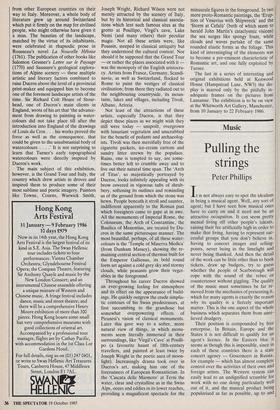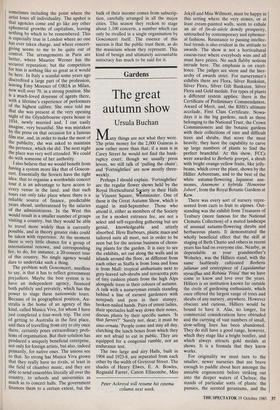Music
Pulling the strings
Peter Phillips
t is not always easy to spot the idealism in being a musical agent. Well, any sort of agent; but I have seen how musical ones have to carry on and it need not be an attractive occupation. It can seem pretty menial living off other people's talents, raising their fee artificially high in order to make that living, having to represent suc- cessful groups that you don't believe in, having to concoct images and selling- points, never being in the limelight and never being thanked. And then the detail of the work can be little other than to book tickets, draw up budgets, try to guess whether the people of Scarborough will cope with the sound of the rebec or countertenor without giggling. The quality of the music must sometimes be far re- moved from the mechanics of presenting it, which for many agents is exactly the reason why its quality is a fiercely important matter. This is the one aspect of the whole business which separates them from unre- lieved drudgery.
Their position is compounded by free enterprise. In Britain, Europe and the States it is not difficult to qualify for an agent's licence. In the Eastern bloc it seems as though this is impossible, since in each of these countries there is a state concert agency — Gosconcert in Russia, for example — which has almost complete control over the activities of their own and foreign artists. The Western system can easily lead to an undignified scramble for work with no one doing particularly well out of it, and the musical product being popularised as far as possible, up to and sometimes including the point where the artist loses all individuality. The upshot is that agencies come and go like any other ephemeral growths of capitalism, leaving nothing by which to be remembered. This is especially true in London where no one has ever taken charge, and where concert- giving seems to me to be quite out of control. The arrangements in Paris are better, where Maurice Werner has the securest reputation; but the competition for him is nothing like so great as it would be here. In Italy a scandal some years ago discredited a large part of the profession, leaving Emy Moresco of ORIA in Milan, now well over 70, in a strong position. She is a much-loved doyenne of agents there, with a lifetime's experience of performers of the highest calibre. She once told me that she was present at the very opening night of the Glyndebourne opera house in 1934, newly married and, I can easily imagine, very beautiful. She was mistaken by the press on that occasion for a famous film star, and, in order to make the most of the publicity, she was asked to maintain the pretence, which she did. The next night the place was very well attended. We could do with someone of her authority. I also believe that we would benefit from having a system more like that of Goscon- cert. Essentially the Soviets have the right idea: that to organise a worthwhile concert tour it is an advantage to have access to every venue in the land; and that such tours can only take place where there is a reliable source of finance, predictable years ahead, unthreatened by the salaries of the administrators. In the West this would result in a smaller number of groups visiting a country, but they would be able to travel more widely than is currently possible, and in theory greater risks could be taken with repertoire. At the moment there is very little chance for a group of international renown, and corresponding fee, to do, for instance, a 20-concert tour of this country. No single agency would dare to undertake such a thing.
The problem with Gosconcert, needless to say, is that it has to reflect government prejudices. Maybe the best system is to have an independent agency, financed both publicly and privately, which has the power to stage these nationwide tours. Because of its geographical position, Au- stralia is the home of an agency of this kind, called Musica Viva, for whom I have just completed a four-week trip. The cost of getting to Australia in the first place, and then of travelling from city to city once there, certainly poses extraordinary prob- lems of organisation. But their solution has produced a uniquely beneficial enterprise, not only for foreign artists, but also, indeed primarily, for native ones. The unions see to that. So strong has Musica Viva grown that they really have no rivals, at least in the field of chamber music, and they are able to send ensembles literally all over the country, to schools and universities as much as to concert halls. The government finances them to a certain extent, but the bulk of their income comes from subscrip- tion, carefully arranged in all the major cities. This season they reckon to stage about 1,100 concerts, a number which can only be rivalled in a single organisation by Gosconcert itself. The essence of this success is that the public trust them, as do the musicians whom they represent. This kind of benign and ultimately accountable autocracy has much to be said for it.



















































 Previous page
Previous page